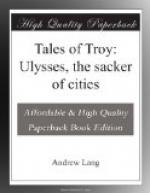Soon after Ulysses was born, his grandfather came to see his mother and father in Ithaca. He was sitting at supper when the nurse of Ulysses, whose name was Eurycleia, brought in the baby, and set him on the knees of Autolycus, saying, “Find a name for your grandson, for he is a child of many prayers.”
“I am very angry with many men and women in the world,” said Autolycus, “so let the child’s name be A Man of Wrath,” which, in Greek, was Odysseus. So the child was called Odysseus by his own people, but the name was changed into Ulysses, and we shall call him Ulysses.
We do not know much about Ulysses when he was a little boy, except that he used to run about the garden with his father, asking questions, and begging that he might have fruit trees “for his very own.” He was a great pet, for his parents had no other son, so his father gave him thirteen pear trees, and forty fig trees, and promised him fifty rows of vines, all covered with grapes, which he could eat when he liked, without asking leave of the gardener. So he was not tempted to steal fruit, like his grandfather.
When Autolycus gave Ulysses his name, he said that he must come to stay with him, when he was a big boy, and he would get splendid presents. Ulysses was told about this, so, when he was a tall lad, he crossed the sea and drove in his chariot to the old man’s house on Mount Parnassus. Everybody welcomed him, and next day his uncles and cousins and he went out to hunt a fierce wild boar, early in the morning. Probably Ulysses took his own dog, named Argos, the best of hounds, of which we shall hear again, long afterwards, for the dog lived to be very old. Soon the hounds came on the scent of a wild boar, and after them the men went, with spears in their hands, and Ulysses ran foremost, for he was already the swiftest runner in Greece.
He came on a great boar lying in a tangled thicket of boughs and bracken, a dark place where the sun never shone, nor could the rain pierce through. Then the noise of the men’s shouts and the barking of the dogs awakened the boar, and up he sprang, bristling all over his back, and with fire shining from his eyes. In rushed Ulysses first of all, with his spear raised to strike, but the boar was too quick for him, and ran in, and drove his sharp tusk sideways, ripping up the thigh of Ulysses. But the boar’s tusk missed the bone, and Ulysses sent his sharp spear into the beast’s right shoulder, and the spear went clean through, and the boar fell dead, with a loud cry. The uncles of Ulysses bound up his wound carefully, and sang a magical song over it, as the French soldiers wanted to do to Joan of Arc when the arrow pierced her shoulder at the siege of Orleans. Then the blood ceased to flow, and soon Ulysses was quite healed of his wound. They thought that he would be a good warrior, and gave him splendid presents, and when he went home again he told all that had happened to his father and mother, and his nurse, Eurycleia. But there was always a long white mark or scar above his left knee, and about that scar we shall hear again, many years afterwards.




